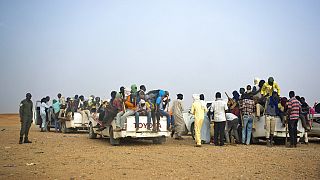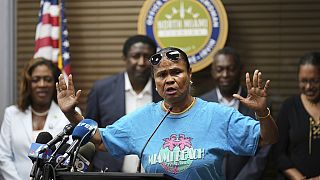USA
Scores of African migrants are sheltering in Churches and Mosques in New York City after they were bused to the city from Texas.
The busing of the migrants is a strategy by Texas’s Republican governor, Greg Abott aimed at pressuring President Biden to stop migrants from coming into the country. A Trump-era policy that barred migrants seeking asylum from entering the United States, known as the “Remain in Mexico” policy was halted by an Appeals Court in March this year following moves by the Biden administration to cancel the policy.
A month after the court’s decision, Governor Abbot started busing migrants to the US capital, Washington D.C. In August, he extended the busing initiative to New York City. In a statement, the Texas governor indicated that "New York City is the ideal destination for these migrants, who can receive the abundance of city services and housing that Mayor Eric Adams has boasted about within the sanctuary city.”
But the housing referenced by Texas’ Republican governor, seems to be in short supply leaving thousands of migrants from African and Latin American countries struggling for shelter.
Mamadou (not his real name), is one of the migrants who arrived in New York City last week. Originally from Senegal, he told me he dropped out of school and left his native country in 2015 for Brazil.
“The conditions in Senegal aren’t bad,” he admitted “but the problem is that when you finish your studies, it is difficult to get a job. If you have a wife and children, feeding them becomes a problem that’s why we had to leave to find another way of helping our families.”
Mamadou lived and worked in Brazil for seven years and speaks Portuguese fluently. But like many other Senegalese who migrated to Brazil, the COVID-19 pandemic made an already bad situation worse for them.
The rent he said, consumed the meager wages they earned making it difficult to send to survive or send money back home to Senegal to take care of the families they left behind hence the decision to move further north to the United States.
Omar Niasse, Imam of the Masjid Ansar Mosque in the Bronx, has been sheltering African arrivals in New York City for a year. He said at one time, he had about 170 migrants living in the mosque which also doubles as his home. The migrants sleep in tents in the backyard and in the mosque itself. Imam Omar feeds them from his pocket and supplies them with food from his grocery store as well.
But after a year of taking in the migrants, the Imam is at his wit's end.
“Right now, my pocket, I’m not saying it’s empty but it’s going down,” the Cleric said. “I have a situation too with my business. My light bill has never reached 5,000 dollars but right now my light bill is at 5,000 dollars. My water bill is at 3,700 dollars. As I talk to you, I owe the mortgage company 3 months.”
He said much as many organizations drop by to check on the migrants, no one is helping him foot the bill of taking care of the migrants. If no financial help comes his way soon, he says he will have to stop accommodating new migrants especially as the winter season approaches. He is worried the backyard will not hold against a possible snowstorm or even heavy rainfall.
Ambrose Ngande who chairs the Social Committee of the African Advisory Council in the Bronx Borough President’s office acknowledges that New York City is currently “having a shelter issue” a development he says explains why some of the migrants are being housed in churches and mosques.
“We’ve had some conversation with the department for human services and they’re actually working on getting some accommodation for them,” he adds. “We know that a couple of weeks ago, the city of New York sent some buses to take them to the shelter. So, as they become available, they get in touch with us, and we take them over there.”
At the moment, it is uncertain when the busing of migrants to New York City will stop. But as long as it continues, the new wave of arrivals will also have to contend with problems of the accommodation unless they have relatives or friends in New York City.











01:45
From Uganda to NYC: Zohran Mamdani's rise in American politics
01:22
Ugandan-born Zohran Mamdani declares victory in New York Democratic mayoral primary
01:05
Migrant centre in landmark New York hotel closes down
01:09
U.S. Supreme court allows Trump to deport migrants to South Sudan and Libya despite safety concerns
01:27
After voting Republican, some Arab-Americans are disappointed with Trump
01:17
United States: San Francisco protesters oppose Trump's new travel ban